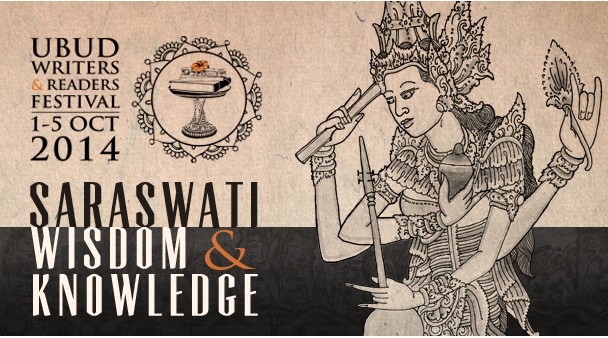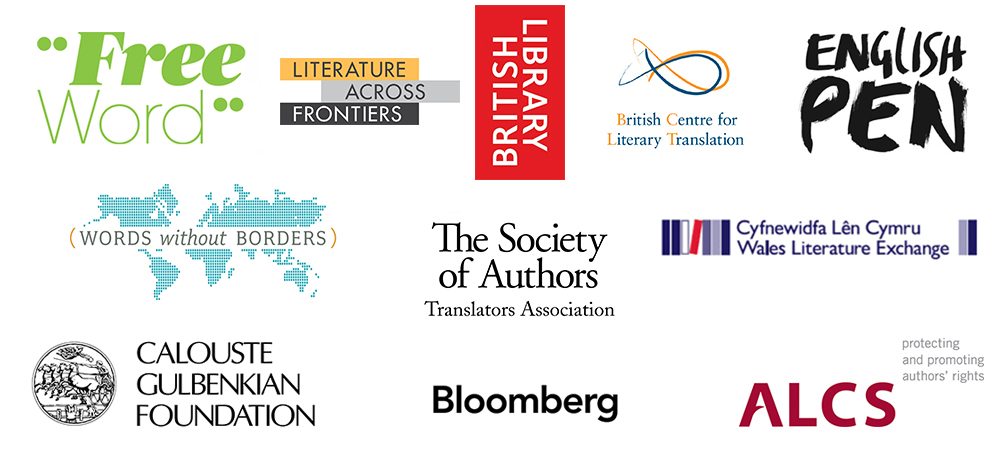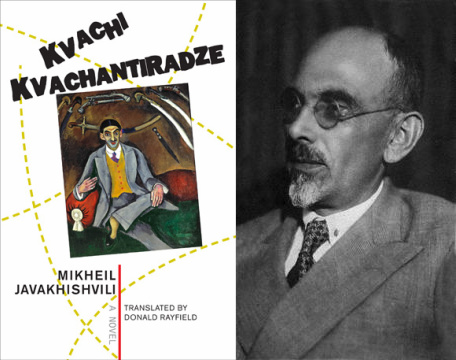Happy Halloween to our All-Hallow’s-Eve-observing readers. Do you have a literary costume? You could dress up as tumultuous Welsh poet Dylan Thomas, who celebrated his 100th birthday this week (from the grave). Or you could simply celebrate by reading R.L. Stine (of Goosebumps fame)’s recently live-tweeted short story, “What’s in my Sandwich?” (Good question). Or ponder the following question, as answered by Ayana Mathis and Francine Prose: what’s the most terrifying book you’ve ever read? READ MORE…
Posts filed under 'literature'
Weekly News Roundup, 31st October 2014: Western Vampire Flicks, Big Kirkus Bucks

This week's literary highlights from across the world
I Chain Myself to the Origins
I chain myself to the origins
of light,
I undo a sunset,
just as poetry touches me,
with my lips I create the fate
of a horizon that glorifies
cemeteries filled with bones.
I rest in the sudden vibration
of a cloud,
intersecting rivers of silence
at the whimsical azure of a crowd
of instants.
Embodied in the exile
of earth and water,
I bind myself to the wind, I yield to the flames.
To eyes permeated by the world
surrounding the sun,
I make myself eternal
like Daphne. I make myself
a forest of olive trees.
Literary Sweden: A Dispatch

Jasmine Heydari reports back from the Södermalms Poetry Festival and Gothenburg Book Fair
September and October are the months for literary events in Sweden, and this year I started my literary adventures with the Södermalms Poetry Festival, which partly took place on an old steamboat cruising through Stockholm’s archipelago, the Skärgården.
Festival director Boel Schenlaer is a well-known poet herself; she often attends national and international festivals, and the Södermalms Poetry Festival is her baby. Running for the 12th year in a row, the festival is three days long. Poets from countries including Israel, Egypt, USA, Syria, and Norway (thirteen nationalities in total) were all invited. As we boated through a dark blue surface shimmering with sunlight, Boel started the poetry cruise, offering everyone a buffet for lunch.
As we ate, Boel told me that her motivation with the festival was to build a bridge between Swedish and international poets.
Berlin native Eva Schweitzer learned a lot about the publishing industry from her years of work as a writer and New York correspondent for German newspapers. In 2011, she decided to open her own publishing house, focusing on books related to the city of Berlin. Eva runs Berlinica between New York City and Berlin. I spoke to her via Skype after one of her frequent trans-Atlantic flights.
Frances Riddle: How was Berlinica born?
Eva Schweitzer: I’m an author and nowadays it’s becoming easier to break into the market, even if you’re small. You don’t need so much overhead anymore. You can do print-on-demand and e-books, you can distribute them internationally with Amazon; and I thought why not try and publish books myself? I know how to write a book. How hard can it be to publish a book?
FR: So was it as easy as you thought it would be to open your own publishing house?
ES: No, it turns out it’s a great deal more time-consuming and complicated than you can imagine. READ MORE…
Weekly News Roundup, 17th October 2014: It’s All Dutch to Me

This week's literary highlights from across the world
The biggest news this week is Asymptote’s hot new issue launch. We know time is limited, but it’s worth taking a peak at our (best yet?) video trailer or the blog’s own highlights feature for tips on where to start (and stay tuned for even more issue coverage in the coming weeks). Really, you can’t go wrong with such a wealth of literary gems at your virtual fingertips.
Last week, the literary world was abuzz with news of its latest Nobel laureate—French writer Patrick Modiano. Perhaps “abuzz” is too misleading a term, since many English-language readers were mostly clueless as to his existence, which begs the question: what does it take for an author to be (respectably and thoroughly) translated into an English? (An aside: here’s a great primer to Modiano via Slate and pure chance). Speaking of prizes, the Man Booker’s decision to include American Anglophones in its entry pool caused quite a stir for those not of the United States, but didn’t stop Australian author Richard Flanagan from snagging the prize. Still, there are naysayers, including twice-winner and Australian author Peter Carey, who thinks the inclusion undermines the particular “Commonwealth culture” of all Anglophones outside the fifty states. Some prizes are still United States-exclusive, though, like the National Book Awards, which just released its nominations—here’s a handy guide to the nominees, via NPR. Or we could switch continents and take a look at the just-released shortlist to the “Russian” Booker.
Notes from the Field: Ubud Writers and Readers Festival 2014

“Is it possible to celebrate linguistic diversity while using one language only—that same language of global hegemony—to do so?”
The Ubud Writers and Readers Festival, held annually in Bali, Indonesia, is Southeast Asia’s largest (and arguably its most well-known) literary festival. This year, the festival featured about 150 writers hailing from more than 25 different countries. Its eleventh iteration, however, proved an even more festive occasion than usual, overlapping with both Saraswati Day—a holy day in the Balinese Hindu calendar dedicated to Saraswati, the goddess of wisdom and knowledge—and a series of religious ceremonies held at the nearby Gunung Lebah Temple. The sun was hot, spirits were high, and the roads were packed as religious and literary pilgrims crisscrossed the small town of Ubud from morning to evening to attend their respective events.
Among the many recurring topics of conversation and debate at the festival was the growing global dominance of the English language. Japanese novelist Minae Mizumura confided her regrets about choosing to write in Japanese rather than English (she was capable of doing both, having spent twenty formative years in the United States), thus forgoing the opportunity to reach the wider audience that writing in English would have afforded her.
And yet, despite initial regrets, Mizumura affirmed her commitment to write in Japanese, noting not only that she has had a far greater impact on Japanese literature than she could have ever had on English literature, but also that she regards writing in a non-English language as a sort of personal moral obligation. Asking her audience to imagine a world in which the best and brightest spoke only English—a horrible, pitiful world, she opined—she regarded her writing as an attempt to save us from that awful fate. READ MORE…
Weekly News Roundup, 10th October 2014: The Nobel Prize, Pick-and-Choose Grammar

This week's literary highlights from across the world
First things first: here at the Roundup, we’ve been speculating about the Nobel Prize in literature for weeks—at one point or another, we had pitted Japanese surrealist Haruki Murakami and Kenyan author Ngũgĩ wa Thiong’o as the two heaviest hitters—but the 2014 Nobel Prize is an upset (isn’t it always?), going to French writer Patrick Modiano. The committee cited Modiano’s “art of memory with which he has evoked the most ungraspable human destinies and uncovered the life-world of the occupation.”
Not even in the discussion this year was American standby Philip Roth, who seems to have resigned himself to perennial snubbing: “I wonder if I had called ‘Portnoy’s Complaint’ ‘The Orgasm Under Rapacious Capitalism,’ I would thereby have earned the favor of the Swedish Academy.” Hah. This sort of snub comes as no surprise, as a famous Nobel judge claims that Western literature is being laid to waste by the big business of creative writing courses and the general tendency toward “professionalization” in literature.
Dispatch: International Translation Day 2014

Our criticism editor goes to UK’s annual celebration of translation
International Translation Day is the UK’s annual event for its translation community. Now in its fifth year, it is an opportunity for translators, writers, publishers, students, booksellers, librarians, and critics to gather and debate significant issues, developments in the industry, to network, learn, and exchange ideas. This year it was held in the conference centre at the British Library in London—quite the upgrade from Farringdon’s Free Word Centre—meaning more guests can benefit from the seminars on offer.
The day kicked off with a panel discussion on continuing professional development, chaired by the nervily impatient Jo Glanville, Director of English PEN. On the panel were non-fiction translator Michael Cunningham, who specialises in translating social policy documents; Lucille Desblache, Director of the Centre for Research in Translation and Transcultural Studies at the University of Roehampton; and Daniel Hahn, tireless champion of all things translation-related, newly elected chair of the Society of Authors, and recent translator of Paulo Scott’s wonderful novel Nowhere People (of note: Hahn somehow found the patience to greet a growing queue of acquaintances and admirers after the panel discussion, before dashing off to catch a flight to Dublin). READ MORE…
Weekly News Roundup, 3rd October 2014: Bad Beginnings, But Is this the Year for Murakami?

This week's literary highlights from across the world
Beginning the weekly roundup is often, well, awkward. But I’d like to think my overtures are not quite as cringe-inducing as these ten worst openers in (English-language) literature.
On that note, if you feel like clicking away from this post to go do something more “productive,” don’t abandon your procrastination so quickly—it turns out the oft-reviled quality of procrastination isn’t so bad for you after all. Speaking of putting things off, while I personally didn’t study for the math portion of my GRE, I passed with (relatively) flying colors. Wonder why, but habits of polyglottism may have something to do with it. READ MORE…
Weekly News Roundup, 27th September 2014: New Gabo, Journalist Jargon

This week’s literary highlights from across the world
A few months ago, we reported on an American train company’s nostalgia-inspired plan to offer residency for certain writers, after some mused that they found they could boost productivity in transit. The company pulled through: here’s the list of the official Amtrak writers-in-residence.
Here’s an interesting twist on the lost-language trope we report on all too often at the Roundup. Language heritage advocates at Viki are enlisting the likes of über-addictive Korean soap operas and (somewhat-less-salient) Mel Gibson movies to help preserve endangered languages across the globe. And while translators are often lamented as all-too-invisible arbiters of global literature, sometimes, that invisibility may be by choice: a profile of the anonymous translator of French writer Alain Robbe-Grillet’s latest shocker, A Sentimental Novel. Meanwhile, things aren’t quite looking up yet for the publishing industry in Nigeria—but it isn’t all bad, either, and one of Spain’s most venerated writers, Javier Marías, is finally getting acknowledged in English-speaking markets (slowly, but surely). READ MORE…
Translation Tuesday: An Excerpt from “Kvachi,” by Mikheil Javakhishvili

A feature from Dalkey Archive Press’s forthcoming Georgian Literature Series, translated by Donald Rayfield
On the first of April that year the weather in Samtredia was stranger than usual. A pitch-black cloud hung over the earth from the morning onwards. Snow, hail, rain and, sometimes, spring sunshine alternated; after a while there was such a gale that the whole township rattled and shook, then a calm silence would descend and you wouldn’t see the slightest movement of a cloud in the sky.
So the first of April in Samtredia started in confusion: it was a deceitful, false, and treacherous day. READ MORE…
Publisher Profile: Ox and Pigeon

"I can’t imagine [digital publishing] is going to be anything but good for translated literature."
Ox and Pigeon Electronic Books embraces the digital age with a dynamic publishing model that enables them to deliver the literature they love to readers anywhere in the world. Since 2012, they have specialized in translations through their literary journal, The Portable Museum. Earlier this year, Ox and Pigeon began releasing their first novels in English translation. I spoke with co-founder Lucas Lyndes from his home in Lima, Peru, via Skype.
Frances Riddle: How was Ox and Pigeon born?
Lucas Lyndes: I moved to Peru in 2005 to learn Spanish with the idea of becoming a translator. I got married here in 2010 and my friends from Boston, Jason Curran and Katie Sedat, came down for the wedding. We got to talking about books because we’re all big readers. I was dabbling in translation and I was surprised at what was being translated; there were a lot of writers who weren’t getting any attention. So we decided to try and do something about it. The idea was born in 2010 and the first issue of The Portable Museum came out in 2012. READ MORE…
Weekly News Roundup, 12th September 2013: The French Boycott Scandal, Rhyming and Signing

This week's literary highlights from across the world
Bad news, optimistic readers: if a book can change your life positively, it follows that it can have the opposite effect as well (well, maybe, at least).
Neither French politicians nor French writers have ever been lauded for their discretion in the face of sex—but call it an apparition: booksellers in France are boycotting the latest juicy tell-all memoir (titled Thank you for this Moment perhaps too preemptively) by Valérie Trierweiler, spurned ex-partner of openly philandering president François Hollande. Seems as though a big issue isn’t the scandal, but the lowbrow scumminess of the whole affair—wonder what the Frankfurt School, including those German ur-critics of popular culture, Theodor Adorno and Walter Benjamin, would have to say about it. READ MORE…
In Jazz-like Dialogue: Interviewing Guest Artist Robert Zhao

In conversation with Robert Zhao, Asymptote's featured guest artist for the summer issue
As the guest artist for Asymptote’s summer issue, Singaporean visual artist Robert Zhao Renhui contributed our cover image and illustrated 15 texts in the Fiction, Nonfiction, Drama, and Latin American Fiction Feature sections. I interview him about this experience, as well as the relationship between image and text in his art practice.
I’ve been following your trajectory for quite a few years, but it’s safe to say that the Asymptote summer issue is presenting your work to an audience that is largely unfamiliar with your practice. How would you explain your art, and the Institute of Critical Zoologists, to our readers?
I am interested in both photography and nature, so in my work, I use photography to investigate our dialogue with nature. The Institute of Critical Zoologists (ICZ) is an umbrella concept under which I create and present my work. The meaning of the ICZ takes shape with each of my projects and exhibitions, which create different realities and fictions.

Could you describe the process of creating/selecting images for this issue?
There was a tension between choosing images that were too literal a representation of the text, and pictures that encapsulated a very personal connection to the text that regular readers may not get. My guiding principle was that my images should be in a jazz-like dialogue with the text, and occasionally surprise the viewer. I submitted a few pictures for each essay, leaving it up to the journal to do the final selection. In some cases, I didn’t know what was chosen until the issue was published. READ MORE…


